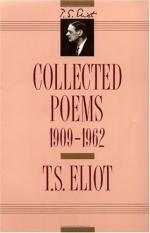|
This section contains 1,310 words (approx. 5 pages at 300 words per page) |

|
Despite Eliot's professed historicism, and his concern with the tradition, the thing which characterizes the rhetoric of his criticism (and his poetry as well) is the absence of presence. To put it another way, history and art can only be an imperfect sign of the divine, an immanence available not to the will but only to an ascetic ecstasy. History and knowledge bear marks of guilt, as in "Gerontian," and only in the silence and innocence of the unspoken Word is the Word known in the world. As in the borrowing from the sermon of Lancelot Andrewes, the "sign" signifies an absence in itself in order to signify the "wonder" that it stands for—"The word within a word, unable to speak a word." The timeless monuments of history, of his early essay, "Tradition and the Individual Talent," are signs in time which signify an order that originates...
|
This section contains 1,310 words (approx. 5 pages at 300 words per page) |

|


